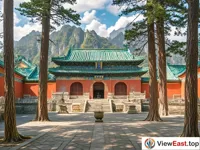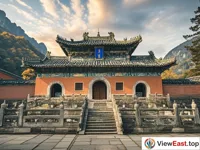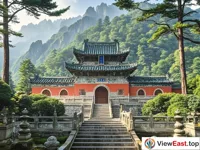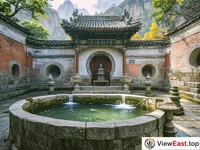







A. Scenic Spot Introduction
Wudang Mountains: The Pinnacle of Natural Beauty and Taoist Sacred Land
In the northwestern part of Hubei Province, along the eastern coastal region of China, lies a mountain that is not only a sacred site of Taoism but also a treasure trove of natural scenery—Wudang Mountains. This mountain is renowned for its majestic peaks, ancient Taoist architecture, and rich cultural heritage.
Natural Beauty:
The natural scenery of Wudang Mountains unfolds like a vibrant Chinese landscape painting. Here, the peaks soar into the clouds, with mist swirling around as if it were a fairyland on earth. The ancient pines on the mountain stand strong and powerful, complementing the strange rocks, clear springs, and cascading waterfalls, creating a captivating scene. The mountain's beauty changes with the seasons—floral splendor in spring, cool green shades in summer, fiery red leaves in autumn, and picturesque snowscapes in winter, offering an unforgettable experience.
Historical Culture:
Wudang Mountains is one of the important birthplaces of Taoism in China, with a long-standing history of Taoist practice. Since the Han Dynasty, it has been a sanctuary for Taoist cultivation. The palaces, Taoist temples, and stone carvings on the mountain bear witness to its historical significance. Every year, countless believers and visitors come here in search of spiritual purification and tranquility.
Cultural Characteristics:
The cultural characteristics of Wudang Mountains are reflected in its unique Taoist and martial arts culture. It is the birthplace of Wudang martial arts, known for its gentle, slow, and continuous movements. At the same time, the Taoist music, rituals, and festive activities on Wudang Mountains showcase the profound essence of traditional Chinese culture.
Unique Experiences:
At Wudang Mountains, you can experience the "Tao of the Clouds." Hike to view the sea of clouds and feel the grandeur of nature; visit ancient temples to experience the serenity of Taoist culture; learn Wudang martial arts to achieve harmony between the body and mind. Additionally, tasting local specialty cuisine, such as the Taoist vegetarian feasts of Wudang Mountains, is an experience not to be missed.
Stories and Metaphors:
Wudang Mountains is like a wise elder, captivating every visitor with its profound connotation and unique charm. Each peak and cloud seems to narrate a tale of nature and Taoism. When you stand amidst these landscapes, you feel as if you've entered a world brimming with tranquility and wisdom.
B. Travel Suggestions
Transportation Routes:
Starting from major cities in China, you can travel to Shiyan City, Hubei Province, by plane, high-speed train, or car. Shiyan City has high-speed train stations and an airport, making it easily accessible. Upon arrival in Shiyan, you can take a tourist shuttle bus or drive to Wudang Mountains.
Tourism Convenience:
The tourism facilities around Wudang Mountains are well-developed, offering a variety of hotels and homestays for tourists to choose from. Additionally, there are multiple service points within the scenic area that provide catering and rest services.
Accommodation, Food, and Safety:
The safety in Shiyan City is good, and tourists can enjoy their visit with peace of mind. The local cuisine is primarily Hubei-style, with specialties such as Taoist vegetarian feasts and Sanhe Soup, which should not be missed.
Specialty Cuisine:
In Shiyan, you can also taste authentic Hubei snacks, such as hot dry noodles and bean skin, which are indispensable parts of experiencing the local culture.